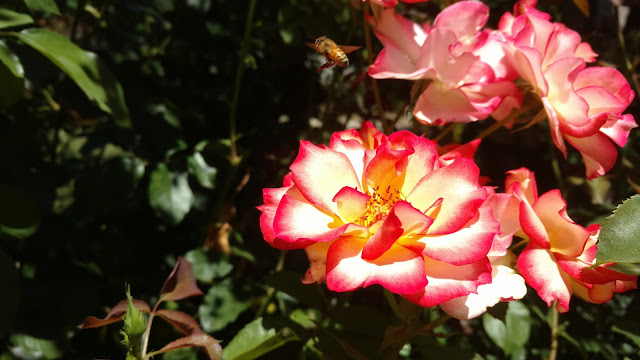
Free workshop shows how to attract more beneficial insects

|
| A honeybee is attracted to these Betty Boop roses. (Photo: Debbie Arrington) |
Want more buzz in your garden? Learn how to attract bees and other beneficial insects during a free virtual workshop, hosted by the UC Cooperative Extension Master Gardeners of Nevada County.
Set for 10 a.m. Saturday, Feb. 12, “Encouraging Beneficial Insects” is open to gardeners everywhere with no advance registration required. Just click the link and Zoom on in. Find it here: https://ncmg.ucanr.org .
Beneficial insects include a lot more bugs than honeybees.
“Pollinators are necessary for food and flower production,” say the master gardeners. “Parasitic insects are healthy alternatives to chemical pesticides. We’ll explain why these insects are desirable and what they need to flourish in your garden.
“We’ll list specific beneficial insects, and specific plants they love in Nevada County,” they add, “and teach you how to use online resources to find more insects and plants on your own.”
That plant list is applicable to most of the greater Sacramento region, too. Plant them and they will come!
Attracting beneficial insects to your great outdoors will make your landscape a much livelier place. Bees, butterflies, lady beetles, praying mantises, parasitoid wasps and more can help you be a better and more thoughtful gardener.
The Nevada County master gardeners hope to start holding in-person public workshops soon. In the meantime, Zoom workshops will continue as an alternative. Upcoming topics include: “Native Plants Bring Beauty and Benefits” (in two parts, Feb. 19 and 26); fire-wise landscaping (March 5); and “Functional Irrigation” (March 12). All workshops start at 10 a.m.
Details: https://ncmg.ucanr.org .
Comments
0 comments have been posted.Sacramento Digs Gardening to your inbox.
Food in My Back Yard Series
April 1: Don't be fooled by these garden myths
March 25: Fertilizer tips: How to 'feed' your vegetables for healthy growth
March 18: Time to give vegetable seedlings some more space
March 11: Ways to win the fight against weeds
March 4: Potatoes from the garden
Feb. 25: Plant a fruit tree now -- for later
Feb. 18: How to squeeze more food into less space
Feb. 11: When to plant? Consider staggering your transplants
Feb. 4: Starting in seed starting
Sites We Like
Garden Checklist for week of March 30
Your garden doesn’t mind April showers. Get busy now to enjoy those future flowers.
* Get ready to swing into action in the vegetable garden. As nights warm up over 50 degrees, start setting out tomato, pepper and eggplant transplants.
* From seed, plant beans, beets, cantaloupes, carrots, corn, cucumbers, melons, pumpkins, radishes and squash. (Soak beet seeds overnight in water for better germination,)
* Plant onion sets.
* In the flower garden, plant seeds for asters, cosmos, celosia, marigolds, salvia, sunflowers and zinnias.
* Transplant petunias, zinnias, geraniums and other summer bloomers.
* Plant perennials and dahlia tubers for summer bloom.
* Transplant lettuce and cabbage seedlings.
* April is the last chance to plant citrus trees such as dwarf orange, lemon and kumquat. These trees also look good in landscaping and provide fresh fruit in winter.
* Smell orange blossoms? Feed citrus trees with a low dose of balanced fertilizer (such as 10-10-10) during bloom to help set fruit. Keep an eye out for ants.
* Apply slow-release fertilizer to the lawn.